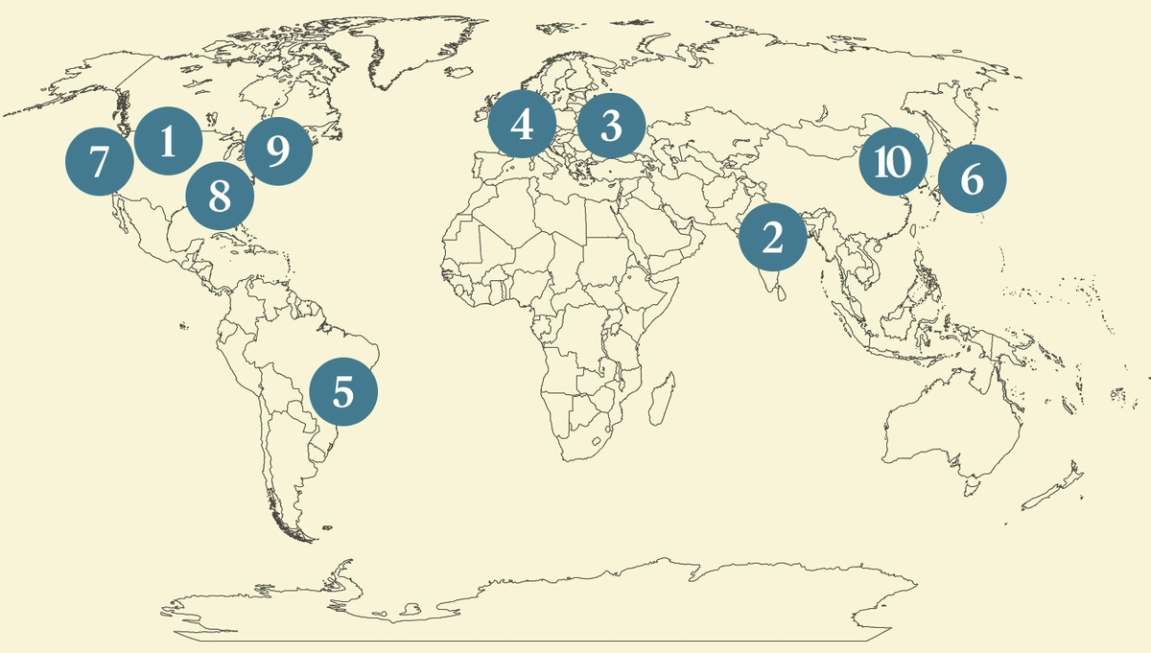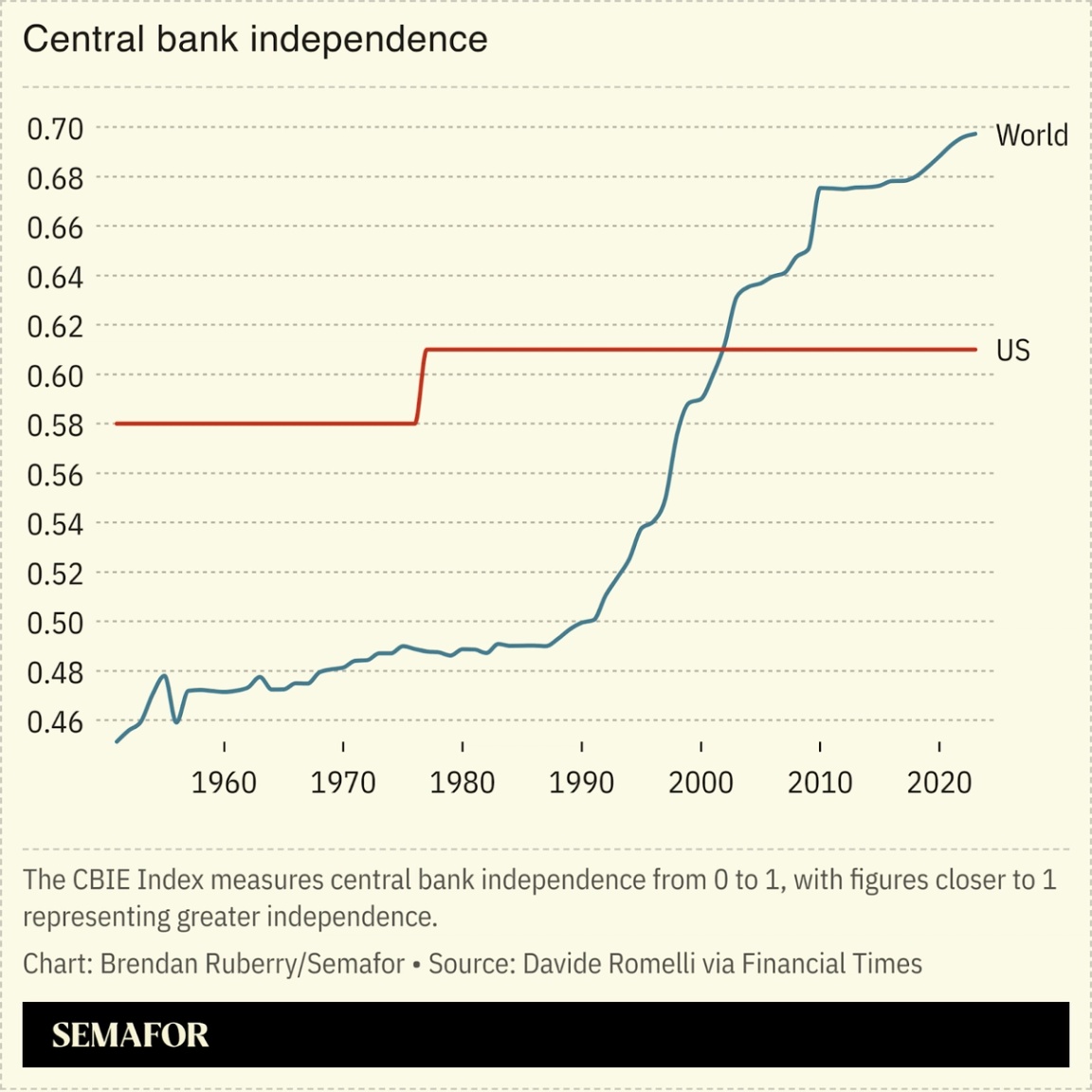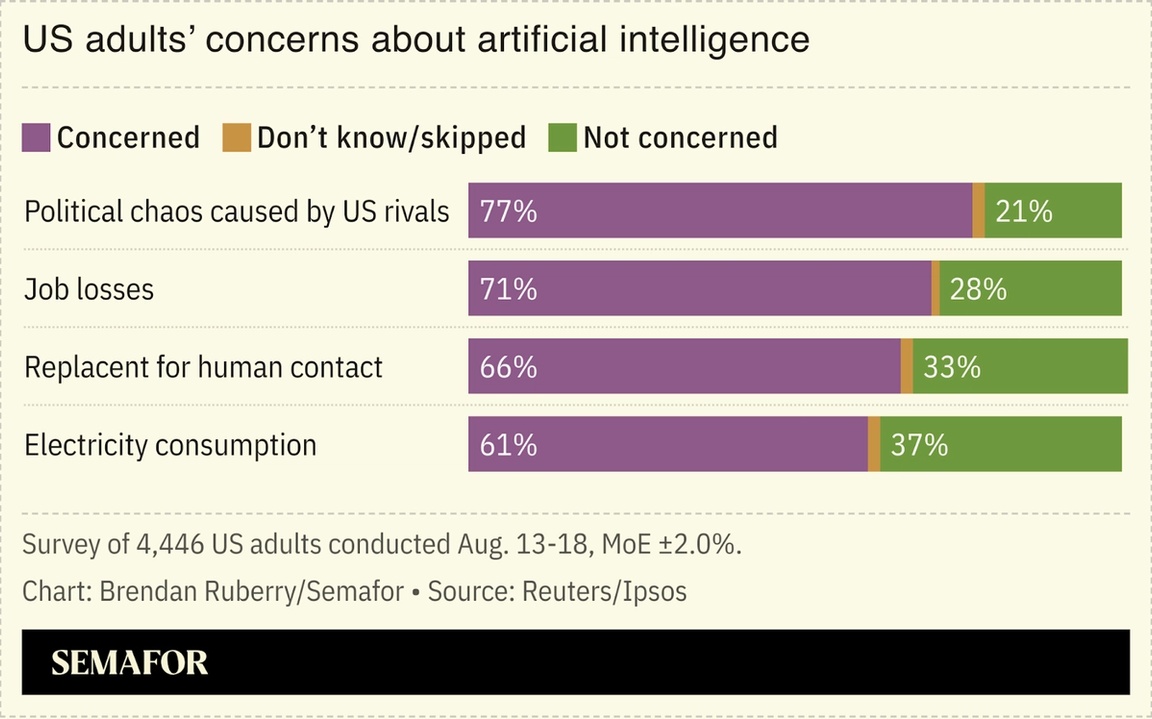| | Trump demands the resignation of a US Federal Reserve policymaker, Russia says India will keep buyin͏ ͏ ͏ ͏ ͏ ͏ |
| |   THIRUVANANTHAPURAM THIRUVANANTHAPURAM |   BEIJING BEIJING |   TAITŌ CITY TAITŌ CITY |
 | Flagship |  |
| |
|
The World Today |  - Trump ups Fed pressure
- India-Russia-China ties
- The futility of summits
- EU eyes non-US trade
- China delivery apps in Brazil
- Japan sushi chain expansion
- Americans fear AI job loss
- Handwriting survives AI
- Ant smuggling boom
- China eases drama rules
 A new origami pattern could inspire spacecraft design. |
|
Trump demands Fed governor resignation |
 US President Donald Trump on Wednesday demanded a Federal Reserve policymaker resign, ramping up pressure on the central bank to lower interest rates. The criticism of a Fed governor over unconfirmed allegations of mortgage fraud signals Trump’s “willingness to weaponize the instruments of government to influence monetary policy,” The New York Times wrote. Experts have warned of dire economic consequences of such interference, and while the Fed has so far resisted Trump’s pressure, an academic who measures central bank independence told the Financial Times that the president’s repeated criticism of Fed Chair Jerome Powell in particular “clearly raises concerns about the de facto independence” of the institution. |
|
Russia says India to keep buying oil |
 Contributor/Getty Images Contributor/Getty ImagesRussia said it expects India to keep buying its oil despite US tariff threats, which have propelled New Delhi to strengthen relations with Moscow and Beijing. A Russian envoy proposed a “special mechanism” to continue supplying crude to India, which has resisted Washington’s demands that it halt purchases. The remarks came during a week in which India’s prime minister hosted China’s foreign minister, and spoke by phone with his “friend,” Russian President Vladimir Putin for the second time this month; Putin is also expected to visit India this year. With New Delhi facing hefty US tariffs if it keeps buying Russian oil, Beijing and Moscow are presenting themselves as more reliable partners. |
|
Trump’s summits fall flat |
 Alexander Drago/Reuters Alexander Drago/ReutersUS President Donald Trump’s flurry of summits in a bid to drive peace talks ultimately accomplished little, several experts wrote. Meetings with the leaders of Russia, Ukraine, and several European countries in the past week were long on bluster but short on details, providing limited clarity on the path to end the war. “So much has happened in recent days, it’s easy to overlook how little has happened,” the former editor-in-chief of Handelsblatt wrote, while a former US diplomat said simply: “The details matter.” Ultimately, Trump’s meeting with Russia’s president may prove the most fruitful, the historian Margaret MacMillan noted wryly, “by raising the question of whether summits are the best way to conduct international relations.” |
|
ECB head calls for non-US trade ties |
 Heiko Becker/Reuters Heiko Becker/ReutersEurope should strive to deepen trade ties with non-US partners, the head of the European Central Bank said Wednesday, as the bloc’s economy begins to feel the heat from Washington’s tariffs. ECB chief Christine Lagarde said that a recently outlined trade deal between the US and European Union had “alleviated, but… not eliminated global uncertainty”: EU exports to the US in June hit their lowest level since the end of 2023. The bloc is one of a number of economies reshaping its trading relationships in the face of US tariffs. China has ramped up exports to Southeast Asia and other developing nations, while Japan is mulling entering trade talks with Latin America’s biggest economic alliance. |
|
Chinese delivery apps duel in Brazil |
 Chen Yongnnuo/China News Service/VCG via Getty Images Chen Yongnnuo/China News Service/VCG via Getty ImagesBrazil’s courts have become a battleground between two Beijing-owned food delivery services, highlighting Chinese companies’ rush to capitalize in developing markets. 99Food, owned by ride-hailing titan DiDi Global, sued the Meituan-owned Keeta app over “numerous visual similarities” to its own, days after Keeta filed its own suit against 99Food. The lawfare demonstrates the growing competition among Chinese services giants in Latin America: Meituan announced a $1 billion investment in Brazil, with hopes of replicating Keeta’s success in the Gulf and Hong Kong by undercutting Western competitors with consumer discounts and lower fees, Rest of World reported. Even as trade wars have pared the reach of companies like Temu and Shein, “innovative Chinese brands are popping up everywhere,” The Economist wrote. |
|
Japan sushi chains expand |
 Kazuhiro Nogi/AFP via Getty Images Kazuhiro Nogi/AFP via Getty ImagesJapan’s conveyor belt sushi restaurants are planning ambitious overseas expansion. The country has a thriving market of low-cost sushi chains, but growth is slowing owing to a saturated market and declining population, Nikkei reported: Sales expansion is expected to fall below 1% next year, prompting several of the biggest operators to look abroad. The largest, Sushiro, which had 200 international outlets in February, is aiming for 310 by September 2026, focused on East and Southeast Asia; it is setting up a pork-and-lard free menu with an eye on Indonesia and Malaysia. Another chain, Kura Sushi, is now targeting North America, with spicy menu options to appeal to US customers. |
|
 The world is smaller than you think. Proximities delivers three overlooked, non-Western news stories to your inbox every weekday. Each issue is concise, insightful, and can be read in just two minutes. It’s free Monday through Friday, with in-depth, paid Saturday editions for readers who want to go deeper. Stay effortlessly informed — the kind of informed that turns heads at dinner parties. Subscribe today. |
|
Americans fear AI-fueled job loss |
 A significant majority of Americans fear artificial intelligence will cause widespread and permanent job losses, a new Reuters poll showed. Already, AI tools that can rapidly generate thousands of lines of code have impacted career prospects: The unemployment rate among new computer science graduates in the US is between 6.1% and 7.5%, more than double that of biology or art history majors. Students who would have been “fighting off offers from top firms” are now struggling, an academic told The New York Times, while one graduate said “the only company that has called me for an interview is Chipotle.” Still, some experts argue against such doomsday scenarios and forecasts of job disruption vary. |
|
AI won’t doom handwriting skills |
The ubiquity of technology in the classroom has sparked concerns that students’ handwriting skills are disappearing — but putting pen to paper isn’t at risk of becoming obsolete, analysts said. Experts broadly agree that simply learning how to write has cognitive benefits, and some US states have passed laws requiring students still learn cursive so the practice endures. But handwriting isn’t doomed, ironically because of technology, Wired argued: As more people use artificial intelligence to cheat their way through school, teachers are reverting to handwritten exams, requiring students to show their work and thought processes. “Handwriting won’t die so much as... provide proof of life.” |
|
US funding cuts fuel ant smuggling |
 Roslan Rahman/AFP via Getty Images Roslan Rahman/AFP via Getty ImagesUS cuts to science funding are not only impacting expansive fields of medical and space research, but are also fueling niche criminal activity. Widespread staffing cuts at a federal agricultural agency have led to a boom in ant smuggling into the US, Wired reported. With some of the country’s best entomologists being let go, there aren’t many people left to monitor illegal activities involving invertebrate pests, emboldening ant smugglers: “Inside the world of illicit wildlife trafficking, there’s a growing assumption that nobody in government is paying attention,” the outlet wrote. Put in context, this might seem like a small problem but, as Wired noted, if illegally sold nonnative ants get loose, “it could have environmental, economic, and public health impacts.” |
|
China eases TV drama rules |
 Adek Berry/AFP via Getty Images Adek Berry/AFP via Getty ImagesChina this week sought to bolster its broadcast sector, aiming to improve the quality of local TV dramas while strengthening its cultural push abroad. Authorities loosened rules on the number of episodes in a series, called for more foreign content on Chinese TV, and pledged additional support for documentary production and animations. The changes were part of a series of new rules d |
|
|